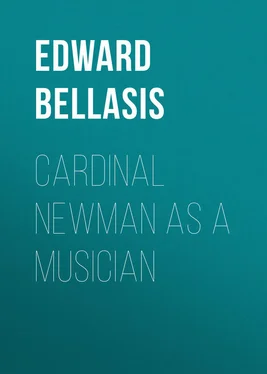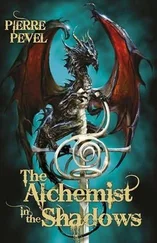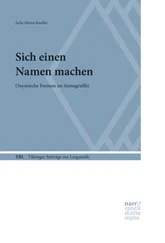Edward Bellasis - Cardinal Newman as a Musician
Здесь есть возможность читать онлайн «Edward Bellasis - Cardinal Newman as a Musician» — ознакомительный отрывок электронной книги совершенно бесплатно, а после прочтения отрывка купить полную версию. В некоторых случаях можно слушать аудио, скачать через торрент в формате fb2 и присутствует краткое содержание. ISBN: , Жанр: foreign_antique, foreign_prose, на английском языке. Описание произведения, (предисловие) а так же отзывы посетителей доступны на портале библиотеки ЛибКат.
- Название:Cardinal Newman as a Musician
- Автор:
- Жанр:
- Год:неизвестен
- ISBN:http://www.gutenberg.org/ebooks/26427
- Рейтинг книги:5 / 5. Голосов: 1
-
Избранное:Добавить в избранное
- Отзывы:
-
Ваша оценка:
- 100
- 1
- 2
- 3
- 4
- 5
Cardinal Newman as a Musician: краткое содержание, описание и аннотация
Предлагаем к чтению аннотацию, описание, краткое содержание или предисловие (зависит от того, что написал сам автор книги «Cardinal Newman as a Musician»). Если вы не нашли необходимую информацию о книге — напишите в комментариях, мы постараемся отыскать её.
Cardinal Newman as a Musician — читать онлайн ознакомительный отрывок
Ниже представлен текст книги, разбитый по страницам. Система сохранения места последней прочитанной страницы, позволяет с удобством читать онлайн бесплатно книгу «Cardinal Newman as a Musician», без необходимости каждый раз заново искать на чём Вы остановились. Поставьте закладку, и сможете в любой момент перейти на страницу, на которой закончили чтение.
Интервал:
Закладка:
Edward Bellasis
Cardinal Newman as a Musician
Music's ethereal fire was given
Not to dissolve our clay,
But draw Promethean beams from Heaven,
And purge the dross away.
It is a remark of St. Philip Neri's latest biographer that, "Our Saint was profoundly convinced that there is in music and in song a mysterious and a mighty power to stir the heart with high and noble emotion, and an especial fitness to raise it above sense to the love of heavenly things." 1 1 Cardinal Capecelatro's Life of St. Philip Neri , translated by the Rev. Thomas Alder Pope, of the Oratory, vol. ii. p. 83.
In like manner the Saint's illustrious son, Cardinal Newman, has spoken of "the emotion which some gentle, peaceful strain excites in us," and "how soul and body are rapt and carried away captive by the concord of musical sounds where the ear is open to their power;" 2 2 Discourses to Mixed Congregations , p. 297, Fourth Edit. 1871.
how, too, "music is the expression of ideas greater and more profound than any in the visible world, ideas which centre, indeed, in Him whom Catholicism manifests, who is the seat of all beauty, order, and perfection whatever." 3 3 Idea of a University , dis. iv. p. 80, Sixth Edit. 1886.
Music, then, to him was no "mere ingenuity or trick of art like some game or fashion of the day without meaning." 4 4 Oxford University Sermons , p. 346, Edit. 1884.
For him man "sweeps the strings and they thrill with an ecstatic meaning." 5 5 Idea , dis. ix. 230. Dr. Chalmers writes to Blanco White: "You speak in your letter of the relief you have found in music… I am no musician and want a good ear, and yet I am conscious of a power in music which I want words to describe. It touches chords, reaches depths in the soul which lie beyond all other influences… Nothing in my experience is more mysterious, more inexplicable." (Blanco White's Life and Correspondence , edited by Thom, 1845, vol. iii. p. 195.)
"Is it possible," he asks, "that that inexhaustible evolution and disposition of notes, so rich yet so simple, so intricate yet so regulated, so various yet so majestic, should be a mere sound which is gone and perishes? Can it be that those mysterious stirrings of heart, and keen emotions, and strange yearnings after we know not what, and awful impressions from we know not whence, should be wrought in us by what is unsubstantial, and comes and goes, and begins and ends in itself. It is not so; it cannot be. No; they have escaped from some higher sphere; they are the outpourings of eternal harmony in the medium of created sound; they are echoes from our home; they are the voice of angels, or the Magnificat of saints, or the living laws of Divine governance, or the Divine attributes, something are they beside themselves, which we cannot compass, which we cannot utter." 6 6 Oxford University Sermons , pp. 346, 347. Writing to her brother about the passage on music, partly cited above, beginning: "There are seven notes in the scale, make them fourteen; yet what a slender outfit for so vast an enterprise! What science brings so much out of so little! Out of what poor element does some great master in it create his new world!" Mrs. J. Mozley says, "We are pleased at your tribute to music, but what do you mean by fourteen notes? Do you mean the twelve semitones, as some suggest? I am indignant at the idea. I think you knew what you were saying. Please tell me when you write." (Mozley, Corr. ii. p. 411.) He replies: "I had already been both amused and provoked to find my gross blunder about the 'fourteen.' But do not, pray, suppose I doubled the notes for semitones, though it looks very like it. The truth is, I had a most stupid idea in my head there were fifteen semi tones, and I took off one for the octave. On reading it over when published, I saw the absurdity. I have a great dislike to publishing hot bread, and this is one proof of the inconvenience." ( Ibid. ) The Second Edition has "thirteen notes," which is correct, if the octave be included, but later editions go back to "fourteen."
And with him, as with St. Philip, may we not say that music held "a foremost place in his thoughts and plans"? 7 7 Pope, Capecelatro , ii. 82.
True, out of its place, he will but allow that "playing musical instruments is an elegant pastime, and a resource to the idle." 8 8 Idea , dis. vi. p. 144.
Music and "stuffing birds" 9 9 Ibid.
were no conceivable substitutes for education properly so called, any more than a "Tamworth Reading-Room" system could be the panacea for every ill; but so long as an art in any given case did not tend to displace the more serious business of life; should it become for such an one an "aid to reflection," or, per contra , profitably distract him; in brief, if it anywise helped a soul on to her journey's end, then welcome the "good and perfect gift."
Thus, of a pupil's violin playing, September, 1865: "There are more important things, and I had some fear that he might be neglecting his proper studies. Now since he has not been, his music is all gain… To my mind music is an important part of education, where boys have a turn for it. It is a great resource when they are thrown on the world, it is a social amusement perfectly innocent, and, what is so great a point, employs their thoughts. Drawing does not do this. It is often a great point for a boy to escape from himself, and music enables him. He cannot be playing difficult passages on the violin, and thinking of anything else." Perhaps he was speaking from experience, for he told us in September, 1875: "I began the violin when I was ten years old," and his two brothers used to accompany him in trios, Frank playing "the bass." On going to Oxford he kept up his music. Thus in February, 1820: "Our music club at St. John's has been offered, and has accepted, the music-room, for our weekly private concerts;" and later: "I went to the R's to play the difficult first violin to Haydn, Mozart, &c.;" 10 10 Mozley, Correspondence , i. p. 52.
and in June, 1820: "I was asked by a man yesterday to go to his rooms for a little music at seven o'clock. I went. An old Don – a very good-natured man but too fond of music – played bass, and through his enthusiasm I was kept playing quartets on a heavy tenor from seven to twelve. Oh, my poor eyes and head and back." 11 11 Ibid.
When the news arrived of his success at Oriel he was practising music. "The Provost's butler – to whom it fell by usage to take the news to the fortunate candidate – made his way to Mr. Newman's lodgings in Broad Street, and found him playing the violin. This in itself disconcerted the messenger, who did not associate such an accomplishment with a candidateship for the Oriel Common-Room, but his perplexity was increased when on his delivering what may be considered to have been his usual form of speech on such occasions, that 'he had, he feared, disagreeable news to announce, viz., that Mr. Newman was elected Fellow of Oriel, and that his immediate presence was required there,' the person addressed merely answered, 'Very well,' and went on fiddling. This led the man to ask whether, perhaps, he had not gone to the wrong person, to which Mr. Newman replied that it was all right. But, as may be imagined, no sooner had the man left than he flung down his instrument and dashed downstairs." 12 12 Mozley, Corr. i. p. 71. On one occasion (between 1860-70) two Oratory boys went up to his room to make a complaint, and hearing only "fiddling" the other side of the door, made bold to enter, but their visit was ill-timed. "Every Englishman's house is his castle," said the Father, and he "went on fiddling." This term, "Father," is what every one in the house called Dr. Newman, and correctly, as being Father Superior of the Oratory. It is the name (it need scarcely be added) that he liked to be called by.
Интервал:
Закладка:
Похожие книги на «Cardinal Newman as a Musician»
Представляем Вашему вниманию похожие книги на «Cardinal Newman as a Musician» списком для выбора. Мы отобрали схожую по названию и смыслу литературу в надежде предоставить читателям больше вариантов отыскать новые, интересные, ещё непрочитанные произведения.
Обсуждение, отзывы о книге «Cardinal Newman as a Musician» и просто собственные мнения читателей. Оставьте ваши комментарии, напишите, что Вы думаете о произведении, его смысле или главных героях. Укажите что конкретно понравилось, а что нет, и почему Вы так считаете.












